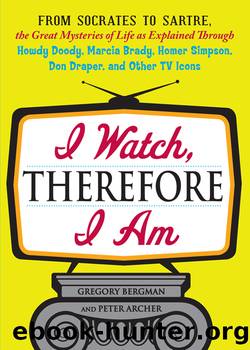I Watch, Therefore I Am by Gregory Bergman

Author:Gregory Bergman [Bergman, Gregory and Archer, Peter]
Language: eng
Format: epub
ISBN: 978-1-4405-2734-0
Publisher: F+W Media
Published: 2011-10-15T00:00:00+00:00
NOT ALL PLEASURES ARE EQUAL
As Utilitarianism developed at the hands of Bentham, James Mill, and John Stuart Mill, it was divided between Act Utilitarianism and Rule Utilitarianism.
1. The Act Utilitarian believes that each moral dilemma should be considered separately in order to determine whether it stands up to the Utilitarian morality test.
2. A Rule Utilitarian believes that the Utilitarian metric for determining the rightness or wrongness of an action should be used to develop basic rules or laws for us to live by.
Dexter Kills Serial Killers
An Act Utilitarian could make a very solid case that Dexter is saving lives by murdering psychopaths and that his actions are therefore in the interest of the public. This meets the test of maximizing pleasure and minimizing pain for the greatest number of people. However, a Rule Utilitarian might have a harder time defending Dexterâs extracurricular exploits. How do you legitimize vigilantismâwhich is what Dexter is doingâwithout destroying the social compact under which weâve all agreed to live? Surely society is better off without the people he kills. But isnât he doing it in the wrong way and for the wrong reasons? Isnât there something disturbing about a guy gratifying his blood lust, even in the interests of a more just society?
Many of us feel this ambivalence watching Dexter. We might think that his murderous behavior is just, but few of us would suggest that the police should let him go if he is caught. We recognize the value of having a rule that states âMurder is wrongâ even if it means that our pal Dexter would be punished for his actions. We are willing to accept that there will be an increase in aggregate utility or âgoodâ if the rule that prohibits murder in all forms is adhered to universally. According to this logic, if there is no law that prevents vigilantes like Dexter from taking the law into their own hands, the general âgoodâ will diminish, even if some bad people are taken off the streets. More innocent people might die if Dexter is jailed, but in the long run a Rule Utilitarian would argue that more people would die if there were more Dexters.
Notice, by the way, the difference between the Utilitarian approach to this issue and that of our old friend Immanuel Kant, who, because of the existence of an unalterable moral imperative thatâs implanted in us (whether by God or something else; but Kant believes we should say itâs God, even if it isnât), would condemn Dexter out of hand. Thereâs a moral imperative against murder under all circumstances. This exists quite apart from its effects on society, something Kantâs not really interested in.
Can We Bring Them Together?
There is, however, an argument that Act and Rule Utilitarianism are not incompatible. Think of our murder laws as they exist right now. Murder is illegal except in the event of self-defense. A Rule Utilitarian may not be able to make exceptions to the rule as in the Dexter case, but, not
Download
This site does not store any files on its server. We only index and link to content provided by other sites. Please contact the content providers to delete copyright contents if any and email us, we'll remove relevant links or contents immediately.
| Direction & Production | Genres |
| Guides & Reviews | History & Criticism |
| Reference | Screenwriting |
| Shows |
Robin by Dave Itzkoff(2441)
Head of Drama by Sydney Newman(2302)
I'm Judging You by Luvvie Ajayi(2204)
The Paranormal 13 (13 free books featuring witches, vampires, werewolves, mermaids, psychics, Loki, time travel and more!) by unknow(2099)
Ten by Gretchen McNeil(1890)
Single State of Mind by Andi Dorfman(1816)
#MurderTrending by Gretchen McNeil(1658)
Key to the Sacred Pattern: The Untold Story of Rennes-le-Chateau by Henry Lincoln(1634)
Merv by Merv Griffin(1616)
Most Talkative by Andy Cohen(1592)
Notes from the Upside Down by Guy Adams(1474)
This Is Just My Face by Gabourey Sidibe(1469)
The Hunger Games: Official Illustrated Movie Companion by Egan Kate(1441)
Binging with Babish by Andrew Rea(1418)
Springfield Confidential by Mike Reiss(1417)
Jamie Oliver by Stafford Hildred(1390)
The TV Writer's Workbook: A Creative Approach To Television Scripts by Ellen Sandler(1349)
Clarkson--Look Who's Back by Gwen Russell(1342)
Blue Planet II by James Honeyborne & Mark Brownlow(1284)
